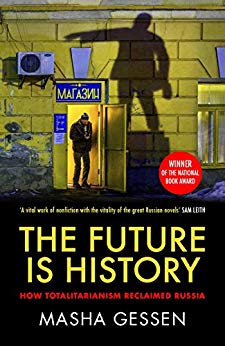The Future Is History
How Totalitarianism Reclaimed Russia
Masha Gessen

Bleak. Quality journalism, an accessible, potted history of Putin’s Russia, but also an update Hannah Arendt, showing how totalitarianism works in the internet age. Very little is offered in the way of hope here. Successive generations of protesters are beaten, arrested, immobilised with bureaucracy and low level terror, occasionally poisoned, and effectively neutralised. Society turns in on itself and rejects those who are trying to change it. Stability is the first goal.
the larger tragedy of losing the intellectual tools of sensemaking,
By its very design, the Soviet ‘socialist’ state is totalitarian because it must not leave the individual any independent space.
The economy of force in totalitarian societies is achieved through terror. Totalitarianism establishes its own social contract, in which most people will be safe from violence most of the time, provided they stay within certain boundaries and shoulder some of the responsibility for keeping other citizens within the same boundaries.
[The term coined by] journalist Fareed Zakaria in a 1997 essay, was “illiberal democracy.” Zakaria emphasized the distinction between democracy, a way of selecting governments through free and open elections, and liberalism, the political project of safeguarding individual freedoms. The two did not necessarily go together.
“It’s easy to notice that the facade of democracy is made of papier-mâché,” she wrote. “But it’s harder to understand that Stalin’s mustache is glued on.
The hybrid regime survived by imitating both democracy and totalitarianism strategically in varied measure, she argued.
Violence and ideology, the pillars of the totalitarian state, became, in the hands of the mafia state, mere instruments.
The post-communist mafia state, in Magyar’s words, is an “ideology-applying regime”
That is how terror works: the threat must be credible yet unpredictable.
It was a great relief to belong, and to entrust authority to someone stronger. The only thing was, belonging itself required vigilance. One had to pay attention: one day Ukraine was where the important war was being fought, the next day it was Syria. In the paranoid worldview, the source of danger was a constantly moving target. One could belong, but one could never feel in control.